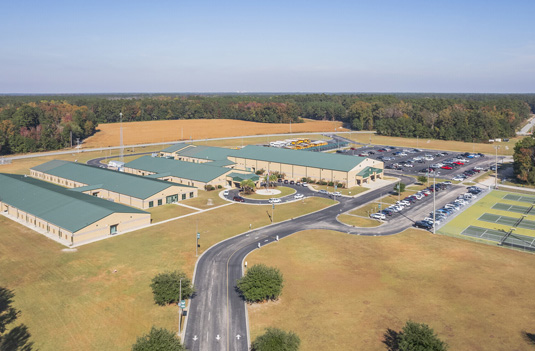A Full Circle of Financial Wellness: From Classroom to Community, and Back Again
At Woodland High School, veteran educator Mary Primus has been shaping young minds in Dorchester, SC since the school’s opening in 1999. She teaches a variety of subjects, from keyboarding to entrepreneurship, and now focuses on Advanced Personal Finance, a mandatory component in the curriculum following the 2022 state mandate for a half-credit financial literacy course required for graduation.
Woodland High School, the only high school in Dorchester District 04, has 612 students in grades 9-12 and grapples with challenges reflected in the school’s 1-star rating from SchoolDigger. Sixty-four percent of students passed South Carolina’s High School Assessment Program (HSAP) on the first try, compared to 84% in neighboring districts. In the 2023-2024 school year, only 28% of Woodland High students were proficient in Algebra 1/Mathematics, compared to 39% in the Dorchester 04 district and 73% statewide. With a 60% minority enrollment and 100% of students considered economically disadvantaged, the school struggles to rise above its perception and overcome the obstacles to academic and personal success.
Educators Behind the Effort
Primus teaches personal finance to high school students in their first year and those about to enter the workforce. Recently, students completed a chapter on renting apartments, considering furnishings, utilities, security deposits, and ultimately – affordability. “Many quickly realize that they can’t afford an apartment for $3,000 and a $1,000 car payment when their monthly income is significantly less than what is needed,” said Primus.
The digital nature of the financial world becomes apparent in Primus’ class when students struggle with check writing, having difficulty spelling out numerals without autocorrect. Since cursive was removed from the required Common Core Standards for K-12 education in 2010, many students are learning to sign their name for the first time.
One Thursday afternoon, 20 juniors and seniors enter the classroom, and Primus reminds them to settle down as they have a visitor. Cassandra Russell, a Woodland High School alumna and financial educator at REV Federal Credit Union, returns to her alma mater to speak about soft skills and budgeting in the classroom where she once was a student of Primus.
Alumni Engagement and Mentorship
Growing up in an environment where discussions about finances were few and far between, Russell discovered at 17 years old, during her freshman year at Coastal Carolina University, that she had a lot to learn about the complexities of personal finance. Her engagement with students in the very classroom where she once sat is a poignant reminder of the importance of early exposure to responsible money management. Russell speaks on healthy financial habits to help them make informed decisions and steer clear of the challenges she faced along her own financial journey.
Sharing in Russell’s experience, Primus encourages parent-child dialogues about money. “Parents should share more with their children about the family’s finances and how money is managed,” said Primus. “Without open communication, we deny our children the opportunity to learn the decision-making behind our financial choices.”
Moving Towards Sustainable Financial Futures
Economic challenges within the community and schools might deter some, yet for Primus, they highlight the importance of setting students up for financial self- sufficiency. For Russell, it’s an indicator that bringing financial education to underserved populations is crucial for both individual and community success.
“Cassandra is the product of the very same community as these kids,” Primus said. “People don’t think there are good people who come out of Woodland, but there are.” Primus is acutely aware of the challenges her students face, some of whom are children of former students. “Some of these kids have parents working 2-3 jobs, so they have to look after their younger siblings, and some are working part-time to make ends meet. It’s a cycle,” remarked Primus. In the front row sits a student who works night shifts, often struggling to stay awake during class due to his late working hours.
To Financial Resilience and Beyond
REV has taken on an important mission to bring financial education to local schools and neighborhoods, investing in the community and its youth with the tools for informed financial decision-making. The organization’s growth and success are intertwined with the well-being of the communities it serves, demonstrated through the REV on Campus program. Recognized for its leadership in youth financial education, the initiative received The Desjardins Youth Financial Education Award and recently welcomed its largest class in Summer 2024.
The efforts and narratives of Primus and Russell both inspire and guide the next generation, instilling responsible decision-making at a young age. Through mentorship, education, and community backing from organizations like REV, students are better positioned to break through barriers and make their own path to a financially stable and secure future.


